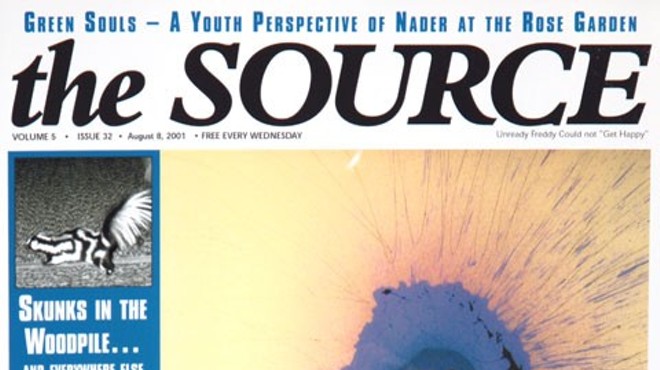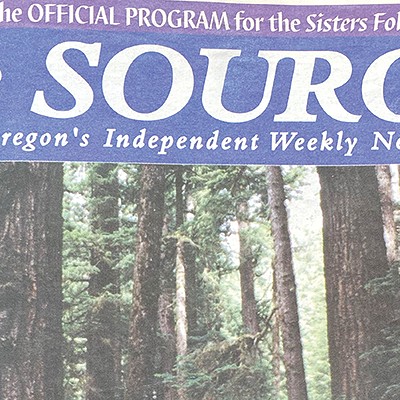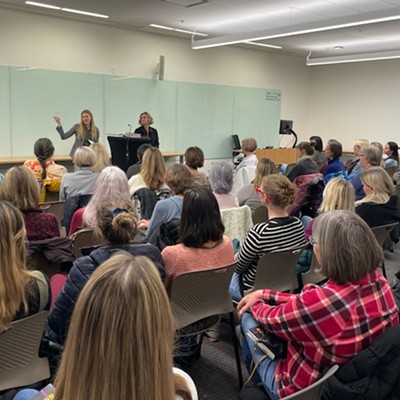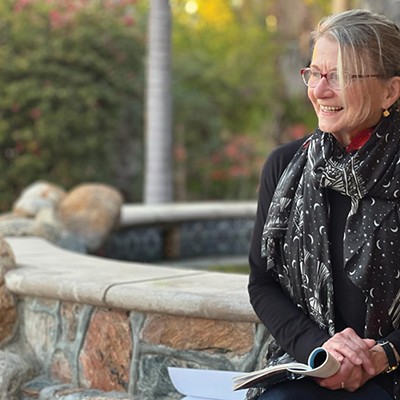In '98, Oregon's state laws did not yet protect members of the LGBTQ community from discrimination, but a Gay Straight Alliance club had just formed among local high school students.
ay Pride Day, which falls this Sunday, the 28th, comes around once a year. In greater numbers, than ever before, homosexuals are looking to this day to show themselves as members of the community. It is time for both straights and gays to contemplate what it means to live in a place where, in spite of continued public awareness, people are still intimidated and socially barred from expressing their sexuality.
Coming out of the closet naturally produces different results for every gay or lesbian who chooses to do so, but one thing is certain: it is a long difficult growth process, not a one time declaration. "It's not like Ellen," says Steven Ploch, Advocate Chair for the local PFLAG chapter (Parents and Friends of Lesbians, Gays, Bisexuals, Transgenders, etc.). Indeed, studies of disclosure indicate that coming out starts with forging a gay or bisexual identity first to self and then to others. Coming to terms with their own sexuality is difficult enough for most gays. Telling others adds the next level of development and fulfillment. In the long run, coming out of the closet is always a step forward for all involved.
For many, the decision to stop hiding their sexual orientation arose from frustration with the daily burden of lies and secrets. Those in the closet must keep up with who does and does not know about them. They don't display a picture of their partner at work for fear of being fired. They constantly scramble pronouns referring to life partners as "they" instead of "he" or "she." They bring friends of the opposite sex to company functions to keep up appearances. For many, living in the closet means not bringing friends home. Ploch says that when he was growing up, his parents thought he was a loner because they never met any of his friends. At age 28, when a long-term, committed relationship dissolved, he was alone is his grief. "No one in the family knew I had just gone through the process of dividing up eight years of my life," he laments. Conversely, when Ploch's brother separated from his wife, "It was a big family ordeal."
Like many gays, Ploch grew weary of hiding his sexuality from friends, family and colleagues. He decided that coming out was worth the rejection he would risk. "When I moved to Central Oregon, I decided that my sexuality would not dictate where I live. I wouldn't be ghettoized." And though he misses the freedoms that go along with living in a "gay ghetto," like holding hands in public, he feels that his life is better without the secrets.
Frank Strong, a senior at Bend High School, came out publicly during his freshman year because people questioned him continually about his sexuality and, "I got tired of saying no," he explains. He says the same people would ask the same question every week. Strong says he finally decided, "If you can't handle the truth, don't ask." Initially he received increased harassment following his disclosure and he questioned his decision, but things seem to have calmed down a bit since. The first year was tough, he says, but his sophomore year brought a surprise. All of a sudden, it became trendy to be his friend. Students he had never met started greeting him in the hallways. Some former harassers even apologized for their insensitive behavior. To his amazement, the athletic coaches have been particularly supportive, especially the football coach, who now says hi to him every day. By his junior year, however, Strong says, the novelty seemed to have worn off. His life returned to normal, but with less harassment than before his disclosure.
Kate Kleaveland, who just graduated from Mt. View High School, is another openly gay teen. She says that her lesbianism is well-known around the school, but no one says anything to her directly. She is sure that people talk behind her back, but the harassment that other gay students have experienced has not been directed toward her. She enjoys the added benefit of having supportive parents and friends. Additionally, she has garnered strength from Bend's Gay Straight Alliance (GSA) - a support group for gay, lesbian, bisexual, transgender and questioning teens - which has been in existence for about six months now. A couple of Mt. View students have learned through the Internet that GSAs have begun forming all over the country, so they met in Café Paradiso to put their club together. Kleaveland says they initially procured permission from Mt. View High School Principal Ed Tillinghast to meet on school grounds, but decided against it because they weren't sure how safe it would be. They didn't want closeted students to avoid the group for fear of being seen meeting with others known to be gay. Also, meeting off school property and outside school hours allows students from surrounding areas to attend. And a dozen or so of these students do attend regularly.
For many gays, coming out of the closet elicits negative responses. Stories of parental rejection abound in the gay community. Erik Strommen in his book, Homosexuality and the Family states that 26% of gay and lesbian youth are forced out of their homes due to family conflicts over their sexuality. Some find themselves at a higher risk for suicide as well. According to the American Journal of Public Health, gay male teens are 7.5 times more likely to attempt suicide than their heterosexual counterparts. Becky Plassman, a teacher at COCC, came out to her parents eight years ago, and they went five years without speaking. Though the silent treatment is now over, she says her parents are still not comfortable, but, "They finally realized it's not going away." As much as Plassman would like to have her family's acceptance, she understands the difficulty they face. She recognizes that it takes years to accept one's own sexuality, and that it is unreasonable to expect parents to figure it out immediately. Still, rejection from family is difficult to handle.
Steven Ploch knows all too well the feeling of the rejection Plassman relates. He says he waited too late to tell his family, after their negative opinions of homosexuals had already been formed. To him, one of the most frustrating aspects of being gay is that someone else has defined him to his family. "My mother didn't get her opinion of gays from her gay son. She got it from the Christian Coalition. We're being defined by people who don't know us and don't want to get to know us."
The picture of gays painted by many groups is not a pretty one. Often, film footage produced by religious organizations shows the most extreme visions of the gay community, ignoring the vast majority, who pass for straight. Recently, Pat Robertson announced that the city of Orlando, Florida can expect God's wrath in the form of tornados, meteors and earthquakes for allowing the public display of rainbow flags, a symbol of diversity. During an interview for The Armstrong Williams Show, Senate Majority Leader Trent Lott referred to homosexuality as a sickness that should be helped, "...just like alcohol...or sex addiction...or kleptomaniacs."
Understandably, gays and lesbians resent the negative caricatures of their community and are working hard to change society's view. More and more members of the gay community have come to believe that their revolution will be greatly helped by a closet exodus. Ploch says, "There's a responsibility to be out where we can be out. The youth need us. They need good role models." Becky Plassman's partner, Dorothy Leman, who also teaches at COCC, says, "The more straight folks who se how many of their friends are gay, the better. When people meet one-on-one, they see that it's really no big deal." Putting a human face on the gay community is seen as one of the best weapons to fight the battle against intolerance and fear.
But coming out does not effect an immediate cure. A myriad of institutional barriers remain in place despite the growing visibility of the gay community. In Oregon and many other states, gays do not enjoy the same civil rights as other minorities. It is perfectly legal to discriminate against gays in housing, employment and public accommodation. Joan Stevens-Schwenger, Public Information Officer for Oregon's Bureau of Labor and Industry, says that if someone is fired because of their sexual orientation, "We have no legal tools to do anything about it," unless they live in Corvallis, Eugene, Portland or Ashland, the only four cities in Oregon to pass ordinances banning such discrimination. Though former Labor Commissioner Mary Wendy Roberts supported a bill to add sexual orientation to the state's non-discrimination list in 1993, and present Labor Commissioner Jack Roberts supports these civil rights for gays, there is no state-wide protection as of yet. In 1998, Oregon Governor Neil Goldschmidt issued an executive order that extended the state's non-discrimination policy to cover gay state employees, but the Oregon Citizens Alliance responded with Measure 8, which struck down the new policy.
In 1992, the Oregon Citizens Alliance (OCA) went even further by placing Measure 9 on the ballot. Had it passed, the new law would have directed the state to declare homosexuality abnormal, perverse, unnatural and wrong. Inflammatory terms like pedophile and necrophilia were included to describe gays and lesbians. Statewide, the measure failed 54%-46%, but the OCA didn't take no for an answer. In 1994, voters were faced with Measure 13, which Barry Pack of Right to Pride, a gay advocacy group, describes as a "kinder, gentler version" of the same basic idea. It failed by a smaller margin, 51.5%-48.5%. Pack is disturbed that "Nearly half of the state is willing to vote for discrimination."
And so it goes with the gay rights movement. Every step forward seems to produce another barrier from anti-gay forces. When it began to look as if gay marriage might become a reality in Hawaii, several states rushed to pass laws ensuring that they would not have to recognize those unions. In 1996, the Defense of Marriage Act passed federally with overwhelming support. Oregon Senator Ron Wyden was one of only eleven senators to vote against the bill, which defined marriage as a union between one man and one woman. Several months later, Oregon State Representative Marilyn Shannon introduced Senate Bill 577, which sought to accomplish the same goal. Gay rights activists quickly organized and testified against it. The delegation sought to point out how many rights go along with marriage. Under Oregon statutes couples gain 700 legal protections when they say "I do." Some of these benefits include the right to make burial decisions, to automatically inherit without a will, to file joint tax returns, to seek wrongful death benefits if a spouse is killed, and to invoke "husband/wife privilege" at trial. Gay couples do have the option of drawing up legal documents to gain some of these protections, but the cost and time involved in recreating 700 rights through a lawyer make the process prohibitive. The bill was derailed, but gays still are denied the right to marry in every state in the nation.
The backlash is not restricted to laws. Between 1998 and 1992, reports of anti gay violence increased in several major cities. The Minneapolis/St. Paul area saw a 1,196% rise, and Boston's anti gay episodes increased 543%. The possible negative consequences of being identified as gay or lesbian are enough to keep most gays in the closet. Steven Ploch estimates that upwards of 90% of the gay community are passing for straight. Central Oregon's conservative climate makes the local closet quite crowded. Becky Plassman says, "The reality of life in Central Oregon is that most people are in the closet." Leman chimes in, "And that's exactly where they should be if that's where they're comfortable." But those who have experienced improved self esteem since coming out wish more of their gay colleagues could find the courage to do the same.























